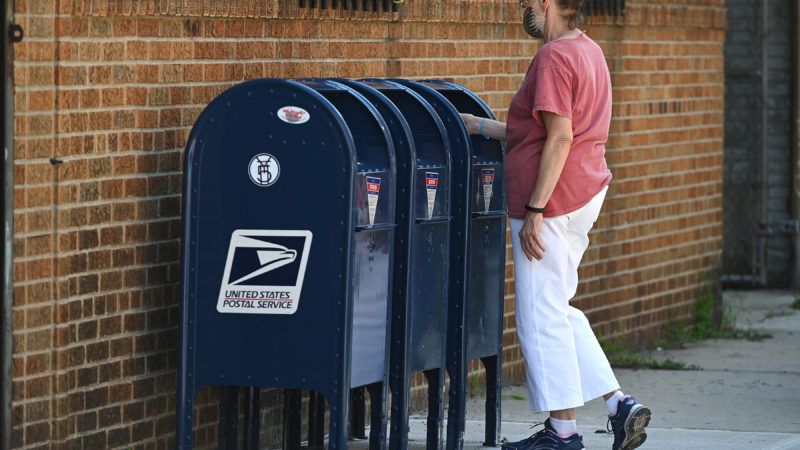Post Office Expects $9 Billion Loss This Year, Will Prioritize Mail-in Ballots Before Election Day
Postmaster Louis DeJoy told members of Congress that the post office must make changes to survive. Will Congress let it?

Postmaster General Louis DeJoy attempted on Friday to depoliticize recent policy changes that have slowed mail service and to calm worries that the post office will be unable to process an expected surge in absentee ballots amid the COVID-19 pandemic.
In testimony to the Senate Homeland Security Committee, DeJoy promised that mailed ballots would be given priority in advance of November's general election. But he also stressed the dire financial straits facing the U.S. Postal Service—circumstances that have been worsened by the pandemic and that will necessitate changes if the post office is to remain functional.
"As we head into the election season, I want to assure this committee and the American public that the Postal Service is fully capable and committed to delivering the nation's election mail securely and on-time," DeJoy told the committee. He voiced support for voting by mail—saying that he intends to vote by mail himself—and promised that "the Postal Service will deliver every ballot."
The post office has found itself at the center of controversy after reports of delivery delays and disconnected mail-sorting machines. Democrats have accused DeJoy, who became postmaster general in June after a successful career as head of a private-sector logistics firm, of implementing those changes in order to interfere with the election. Most states have expanded the availability in mail-in voting this year in response to the coronavirus pandemic and in hopes of preventing crowding at polling places.
Both sides have been blowing the issue out of proportion. President Donald Trump has alleged that the more widespread use of mail-in voting is ripe for fraud, but there is no evidence to support that claim; Trump himself has voted by mail as recently as March of this year. Democrats, meanwhile, believe DeJoy is engaged in a nefarious plot to disenfranchise Americans, even though the expected uptick in mail volume around the election would fall well within the post office's usual capabilities.
It's good to see that DeJoy is trying to lower the temperature surrounding this debate. He told the committee on Friday that more "dramatic changes" to mail service will be postponed until after the election.
That makes sense. But make no mistake about it: Dramatic changes are necessary. The post office, DeJoy said, is facing the prospect of a $9 billion shortfall this year alone—a huge total for an agency that is supposed to be self-sustaining.
If members of Congress are surprised to learn that the post office needs serious reforms, they haven't been paying attention. The Government Accountability Office warned in May that the post office's business model is "not financially sustainable" after it lost $78 billion since 2007.
Pension costs are driving those losses. At the end of 2019, the postal pension fund had $50 billion in unfunded liabilities—that's the long-term gap between what the fund expects to pay out to current and future beneficiaries and the amount of revenue the fund is expected to collect from workers' paychecks and investment earnings. The fund that covers health care expenses for retired postal workers is facing a $69 billion unfunded liability.
But the post office can't do anything about those pension costs without congressional approval, DeJoy reminded the committee on Friday. Indeed, the post office has been asking Congress for years to approve changes to help stanch the bleeding, including reducing delivery days, closing locations that have few customers, and repealing collective bargaining. If members of Congress aren't going to support wholesale changes to how the Portal Service does business, they shouldn't be surprised when DeJoy tries to save money in the few ways available to him.
The good news is that the post office's longterm troubles are mostly disconnected from partisan electoral politics, and that the Portal Service should be capable of handling mail-in ballots in November. The bad news is that, once the election is over, not many people are likely to keep caring care about the very real problems that do exist within America's mail system.


Show Comments (161)